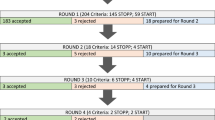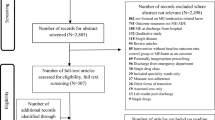Abstract
Background Discharge prescribing error is common. Little is known about whether it persists post-discharge. Objective To explore the relationship between discharge prescribing error and post-discharge medication error. Setting This was a prospective observational study (March–May 2013) at an adult academic hospital in Ireland. Method Patients using three or more chronic medications pre-admission, with a clinical pharmacist documented gold-standard pre-admission medication list, having a chronic medication stopped or started in hospital and discharged to home were included. Within 10–14 days after discharge a gold standard discharge medication was prepared and compared to the discharge prescription to identify differences. Patients were telephoned to identify actual medication use. Community pharmacists, general practitioners and hospital prescribers were contacted to corroborate actual and intended medication use. Post-discharge medication errors were identified and the relationship to discharge prescribing error was explored. Main outcome measured Incidence, type, and potential severity of post-discharge medication error, and the relationship to discharge prescribing. Results Some 36 (43 %) of 83 patients experienced post-discharge medication error(s), for whom the majority (n = 31, 86 %) were at risk of moderate harm. Most (58 of 66) errors were discharge prescribing errors that persisted post-discharge. Unintentional prescription of an intentionally stopped medication; error in the dose, frequency or formulation and unintentional omission of active medication are the error types most likely to persist after discharge. Conclusion There is a need to implement discharge medication reconciliation to support medication optimisation post-hospitalisation.



Similar content being viewed by others
References
Coleman EA, Roman SP. Family caregivers’ experiences during transitions out of hospital. J Healthc Qual. 2015;37(1):12–21.
Kripalani S, LeFevre F, Phillips CO, Williams MV, Basaviah P, Baker DW. Deficits in communication and information transfer between hospital-based and primary care physicians: implications for patient safety and continuity of care. J Am Med Assoc. 2007;297:831–41.
Armor BL, Wight AJ, Carter SM. Evaluation of adverse drug events and medication discrepancies in transitions of care between hospital discharge and primary care follow-up. J Pharm Pract. 2016;29:132–7.
Forster AJ, Murff HJ, Peterson JF, Gandhi TK, Bates DW. Adverse drug events occurring following hospital discharge. J Gen Intern Med. 2005;20:317–23.
Bell CM, Brener SS, Gunraj N, Huo C, Bierman AS, Scales DC, et al. Association of ICU or hospital admission with unintentional discontinuation of medications for chronic diseases. J Am Med Assoc. 2011;306:840–7.
Witherington EMA, Pirzada OM, Avery AJ. Communication gaps and readmissions to hospital for patients aged 75 years and older: observational study. Qual Saf Healthc. 2008;17(1):71–5.
Slight SP, Howard R, Ghaleb M, Barber N, Franklin BD, Avery AJ. The causes of prescribing errors in english general practices: a qualitative study. Br J Gen Pract. 2013;63(615):e713–20.
Coleman EA, Smith JD, Raha D, Min S. Posthospital medication discrepancies: prevalence and contributing factors. Arch Intern Med. 2005;165:1842–7.
Glintborg B, Hillestrøm PR, Olsen LH, Dalhoff KP, Poulsen HE. Are patients reliable when self-reporting medication use? validation of structured drug interviews and home visits by drug analysis and prescription data in acutely hospitalized patients. J Clin Pharmacol. 2007;47:1440–9.
Kwan JL, Lo L, Sampson M, Shojania KG. Medication reconciliation during transitions of care as a patient safety strategy: a systematic review. Ann Intern Med. 2013;158:397–403.
Mekonnen AB, McLachlan AJ, Brien J-E. Pharmacy-led medication reconciliation programmes at hospital transitions: a systematic review and meta-analysis. J Clin Pharm Ther. 2016;41:128–44.
Mueller SK, Sponsler KC, Kripalani S, Schnipper JL. Hospital-based medication reconciliation practices: a systematic review. Arch Intern Med. 2012;172:1057–69.
Mekonnen AB, McLachlan AJ, Brien J-aE. Effectiveness of pharmacist-led medication reconciliation programmes on clinical outcomes at hospital transitions: a systematic review and meta-analysis. BMJ Open. 2016;6:e010003.
Wong JD, Bajear JM, Wong GG, Alibhai SM, Huh J-H, Cesta A, et al. Medication reconciliation at hospital discharge: evaluating discrepancies. Ann Pharmacother. 2008;42:1373–9.
Greenwald JL, Halasyamani LK, Greene J, LaCivita C, Stucky E, Benjamin B, et al. Making inpatient medication reconciliation patient centered, clinically relevant, and implementable: a consensus statement on key principles and necessary first steps. Jt Comm J Qual Patient Saf. 2010;36:504–13.
Farley TM, Shelsky C, Powell S, Farris KB, Carter BL. Effect of clinical pharmacist intervention on medication discrepancies following hospital discharge. Int J Clin Pharm. 2014;36:430–7.
Grimes TC, Duggan CA, Delaney TP, Graham IM, Conlon KC, Deasy E, et al. Medication details documented on hospital discharge: cross-sectional observational study of factors associated with medication non-reconciliation. Br J Clin Pharmacol. 2011;71:449–57.
Michaelsen MH, McCague P, Bradley CP, Sahm LJ. Medication reconciliation at discharge from hospital: a systematic review of the quantitative literature. Pharmacy. 2015;3(2):53–71.
Mills PR, Weidmann AE, Stewart D. Hospital discharge information communication and prescribing errors: a narrative literature overview. Eur J Hosp Pharm. 2015;. doi:10.1136/ejhpharm-2015-000677.
Grimes T, Duggan C, Delaney T. Pharmacy services at admission and discharge in adult, acute, public hospitals in Ireland. Int J Pharm Pract. 2010;18:346–52.
Fitzsimons M, Grimes T, Galvin M. Sources of pre-admission medication information: observational study of accuracy and availability. Int J Pharm Pract. 2011;19:408–16.
Dean B, Barber N, Schachter M. What is a prescribing error? Qual Healthc. 2000;9:232–7.
Grimes TC, Deasy E, Allen A, O’Byrne J, Delaney T, Barragry J, et al. Collaborative pharmaceutical care in an Irish hospital: uncontrolled before–after study. BMJ Qual Saf. 2014;23:574–83.
Dean BS, Barber ND. A validated, reliable method of scoring the severity of medication errors. Am J Health Syst Pharm. 1999;56:57–62.
Nazar H, Nazar Z, Portlock J, Todd A, Slight SP. A systematic review of the role of community pharmacies in improving the transition from secondary to primary care. Br J Clin Pharmacol. 2015;80:936–48.
Beauchesne M-F, Nenciu LM, Dinh T-H, Tassé M, Fillion A, Labrecque M, et al. Active communication of a pharmacy discharge plan for patients with respiratory diseases: a pilot study. J Pharm Tech. 2007;23(2):67–74.
Duggan C, Feldman R, Hough J, Bates I. Reducing adverse prescribing discrepancies following hospital discharge. Int J Pharm Pract. 1998;6:77–82.
Hugtenburg J, Borgsteede S, Beckeringh J. Medication review and patient counselling at discharge from the hospital by community pharmacists. Pharm World Sci. 2009;31:630–7.
Urban R, Paloumpi E, Rana N, Morgan J. Communicating medication changes to community pharmacy post-discharge: the good, the bad, and the improvements. Int J Clin Pharm. 2013;35:813–20.
Paulino EI, Bouvy ML, Gastelurrutia MA, Guerreiro M, Buurma H. Drug related problems identified by European community pharmacists in patients discharged from hospital. Pharm World Sci. 2004;26:353–60.
Aziz C, Grimes T, Deasy E, Roche C. Compliance with the health information and quality authority of Ireland national standard for patient discharge summary information: a retrospective study in secondary care. Eur J Hosp Pharm. 2016;. doi:10.1136/ejhpharm-2015-000748.
Pippins JR, Gandhi TK, Hamann C, Ndumele CD, Labonville SA, Diedrichsen EK, et al. Classifying and predicting errors of inpatient medication reconciliation. J Gen Intern Med. 2008;23:1414–22.
Franklin BD. Medication errors: do they occur in isolation? BMJ Qual Saf. 2014;23(5):e1. doi:10.1136/bmjqs-2014-002924.
Grimes T, Delaney T, Duggan C, Kelly JG, Graham IM. Survey of medication documentation at hospital discharge: implications for patient safety and continuity of care. Ir J Med Sci. 2008;177:93–7.
Holland D. Interdisciplinary collaboration in the provision of a pharmacist-led discharge medication reconciliation service at an Irish teaching hospital. Int J Clin Pharm. 2015;37:310–9.
Acknowledgments
We wish to thank the doctors and pharmacists involved in assessing the potential harm of the unintended post-discharge medication incident(s).
Funding
None.
Author information
Authors and Affiliations
Corresponding author
Ethics declarations
Conflicts of interest
None.
Rights and permissions
About this article
Cite this article
Riordan, C.O., Delaney, T. & Grimes, T. Exploring discharge prescribing errors and their propagation post-discharge: an observational study. Int J Clin Pharm 38, 1172–1181 (2016). https://doi.org/10.1007/s11096-016-0349-7
Received:
Accepted:
Published:
Issue Date:
DOI: https://doi.org/10.1007/s11096-016-0349-7




